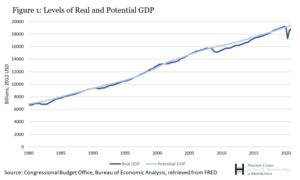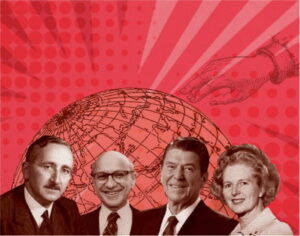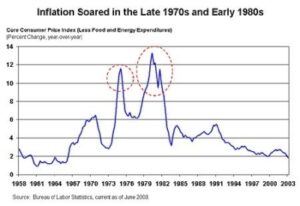The image for this post is a little misleading.
Institutionalism is not about what most people consider to be institutions, but rather the culture and how culture defines/imposes rules we all follow.
In a way, this is another example of economists putting names on things that at first glance don’t make much sense.
So (in my humble opinion) it’s especially important in economics to learn what is meant by the use of labels, rather than infer what is meant from the label itself.
In institutionalism, institutions are the rules we follow, be they formal rules that are written down or informal rules that everyone knows.
Organizations are organizations in which those rules are followed.
Banking is an institution. It has rules. Wells Fargo Bank is an organization.
This post is a summary of chapter 7 (Institutionalism) of the book Contending Perspective in Economics by John T Harvey Ph.D. I’m summarizing this book because it’s such a great little book (151 pages, but packed full of insights).
Table of Contents
Origins of institutionalism
Institutionalism started in the United States in the latter part of the 19th century, apparently by accident, primarily by two people (John R. Commons – 1862 to 1945 and Thorstein Veblan – 1857 to 1929).
Their criticisms of existing economics seem to be that it started from the wrong set of core concepts.
Other schools of economic thought start with ideas about value, labour, growth, expansions, contractions, currency valuations, inflation, etc.
To institutionalists, these ideas, while very important, are the “rules of the game”.
Institutionalists believe that “the rules of the game” as pertains to economics are not consistent between different human societies and cultures, and are not even consistent between subgroups within what is generally recognized as “a society”.
To an institutionalist, the place to start is to figure out what the rules of the game are.
In the same way that the early classical economists (Adam Smith, David Ricardo, etc) were heavily influenced by the new scientific ideas of Newtonian physics, the early institutionalist economists were heavily influenced by the new scientific ideas of evolution through natural selection.
Institutionalists see what occurs today as an extension of, and development from, what occurred in the past.
To institutionalists, humans are social creatures (pack animals if you will) to whom community (tribal if you will) connections and traditions matter and have a strong influence.
In the past, being cast out of your tribe could place our very survival at risk, and even today, to be cast out of your tribe can have serious implications for a person’s ability to earn an income and “find a place” in the world.
For this reason, we want to be accepted by our tribes, and as such we, generally without thinking about it, adhere to the rules, however informal, of what it means to be a member.
To the institutionalist, in order to understand modern capitalism, you must understand the underlying societal structures that make it the rules of the game.
The institutionalist approach
These are important concepts of institutionalism that feel foreign to other schools of economic thought and make institutionalism look to them more like sociology than economics.
The institutional structure of any society incorporate two systems of value: the ceremonial and the instrumental, each of which has its own logic and method of validation. While these two value systems are inherently incompatable, they are intertwined within the institutional structure through a complex sxet of relationships.
Paul Dal Bush 1987 p. 1079
Ceremonial? Instrumental? What are these? How do these relate to economics?
To the institutionalist, these are the “deeper structures” within a society to help explain why the rules of the game are the way they are.
Ceremonial values
This is the stuff we do to fit into our society (tribe) that for the most part, we are not consciously aware of.
These are the things we inherit from our parents, grandparents, and more distant ancestors.
- Why do some men tie a piece a cloth (a neck tie) around their neck before going to certain venues?
- Why do some women wear high heels?
- Why was the African slave trade once acceptable?
- Later, why was Jim Crow segregation considered acceptable in the American south?
- Why do we today value investment bankers more than teachers?
- Why do we complain that highly centralized planning by government beaucrates (socialism) is dangerous, but not make the same complaint about highly centralized planning by the corporate boards (crony capitalism) of our largest corporations?
- Why do we “have to” bail out large banks and prevent them from restructuring under bankruptcy law when they mismanage their businesses, but not have to bail out large airlines when they do the same?
I went to some economically systemic ideas because my mind goes there, but I think you get the point.
These are the thing we simply take for granted and do “just because” or “that’s the way it’s’ done”.
These ceremonial things define the rules that make sense to us and the rules that don’t.
For example, in a neoclassic economic framework, the market would solve the racism of 1950s Mississippi, because if, for example, a jewelry store known for quality goods hired a highly qualified black salesperson, their commercial success would acclimate jewelry shoppers to the existence of a black salesperson and it would become “more normal”.
The institutionalists believe the neoclassical economists are leaving out that racism was so systemic to Alabama in the 1950s that the jewelry store would initially be boycotted, and would possibly be firebombed.
And there was no market solution for that.
But, these ceremonial values and ideas are part of what makes us part of our tribe.
Questioning them can be risky.
Instrumental values
Instrumentality, on the other hand, is warranted goal-oriented behavior appropriate for solving problems.
Instrumental behaviors are not culturally relevant and can be done outside of social norms.
Professor Harvey uses an interesting example of dental health to make this point.
While people in ancient Rome, modern America or 18th century China may have done dental health differently, the goal for everyone was the same.
Keep as many teeth in your mouth for as long as possible, preferably forever.
If in your culture someone came up with a better method, you would likely have no objection to trying it, if it seemed better than the existing method.
For most cultures, there is no cultural baggage associated with dental health.
Is one better than the other?
In a very real sense, yes.
Cultures that weigh ceremonial above instrumental progress very slowly, if at all.
Technological innovation requires that instrumental be stronger than ceremonial.
If the Wright brothers had lived in a culture that feared experimentation or feared the idea of flight, the odds of them inventing powered flight would have been slim to none.
For in order for them to do so, they would have had to first reject some of the core values of their tribe, which is hard for most of us to do.
A strong focus of institutionalism
The basic aim of Institutional research is to determine by which value set an economy is primarily driven.
Harvey, J. (2016). Contending Perspectives in Economics: A Guide to Contemporary Schools of Thought (Reprint ed.). Edward Elgar Pub. p. 115
As stated above, but I think bears repeating, is that a strong focus on the ceremonial holds back economic progress whereas a strong focus on the instrumental encourages economic progress.
Method
Learn the rules
Institutionalists do not assume that economic behavior is standard.
People living in different cultures, at different times, simply have different sets of beliefs, values, and economic rules.
So institutionalists start by examining how things are, and how things came to be that way.
That is, they start by trying to understand the rules of the game.
Cultures that value status and conspicuous consumption over innovation are very different from ones that value the opposite.
Take for example, under capitalism, “make a profit” is a rule that when violated has very serious consequences.
While we take this for granted as we live in a capitalist system, this HAS to be known in order for our behaviors to make sense.
The economy is part of larger social systems
The US economy of the 1770s was very different from the US economy of the 1850s which was very different from the US economy of the 1950s, which is very different from the US economy today.
All of those US economies were shaped by beliefs and values that were held at the time, some of which carried forward to today and some of which did not.
Ignoring this will lead you astray.
System dynamics
There is a tool called Systems Dynamics that modern institutionalists use to model the complexities of modern economies.
I can not elaborate on what it is and how it works because I haven’t yet taken the time to learn.
Having said that, I have seen some “charts” put together by Steve Keen that look very much like system dynamic diagrams, and if he’s using it, I’m in.
Why? Because in 1995 he wrote a paper which predicted the 2008 great financial crisis. So whatever tools he’s using and/or developed seem to be working.
Views of human nature and justice
Humans are first and foremost social animals.
We naturally live in groups.
Groups share beliefs and values, which might look ridiculous to people outside the group, are an integral part of the group’s identity, and are generally not questioned by members of the group.
We like to be considered “good citizens” within our group, and as such tend to adhere to its social norms.
The primary focus on justice is the existence, or not, of exploitative behavior within a society, within an economy.
An economy is fair when the instrumental aspects of it are used to solve real problems being felt by real people, rather than allowing the ceremonial aspects of the society to “get in the way”.
Criticisms
Most traditional economists criticize institutionalists as “all descriptive, no theory or modeling”.
The other main criticism is that while the research they do is valid and has value, it’s not economics.




